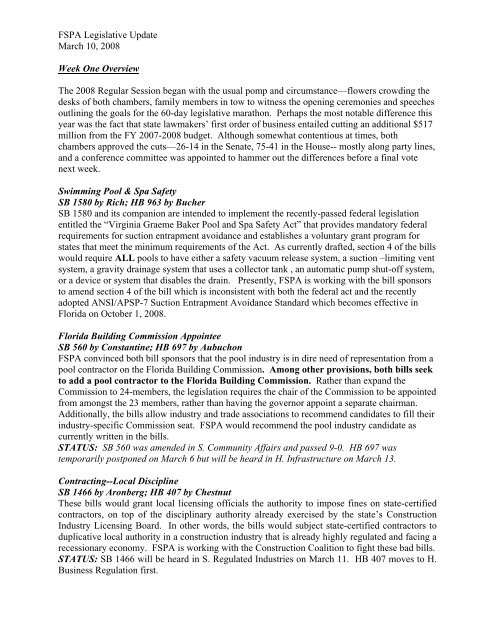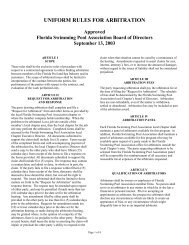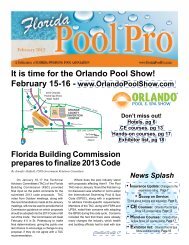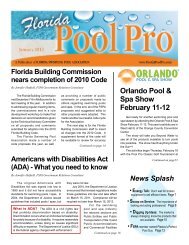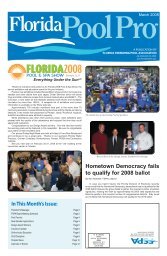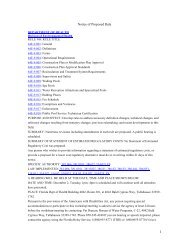FSPA Legislative Update - the Florida Swimming Pool Association
FSPA Legislative Update - the Florida Swimming Pool Association
FSPA Legislative Update - the Florida Swimming Pool Association
You also want an ePaper? Increase the reach of your titles
YUMPU automatically turns print PDFs into web optimized ePapers that Google loves.
<strong>FSPA</strong> <strong>Legislative</strong> <strong>Update</strong><br />
March 10, 2008<br />
Week One Overview<br />
The 2008 Regular Session began with <strong>the</strong> usual pomp and circumstance—flowers crowding <strong>the</strong><br />
desks of both chambers, family members in tow to witness <strong>the</strong> opening ceremonies and speeches<br />
outlining <strong>the</strong> goals for <strong>the</strong> 60-day legislative marathon. Perhaps <strong>the</strong> most notable difference this<br />
year was <strong>the</strong> fact that state lawmakers’ first order of business entailed cutting an additional $517<br />
million from <strong>the</strong> FY 2007-2008 budget. Although somewhat contentious at times, both<br />
chambers approved <strong>the</strong> cuts—26-14 in <strong>the</strong> Senate, 75-41 in <strong>the</strong> House-- mostly along party lines,<br />
and a conference committee was appointed to hammer out <strong>the</strong> differences before a final vote<br />
next week.<br />
<strong>Swimming</strong> <strong>Pool</strong> & Spa Safety<br />
SB 1580 by Rich; HB 963 by Bucher<br />
SB 1580 and its companion are intended to implement <strong>the</strong> recently-passed federal legislation<br />
entitled <strong>the</strong> “Virginia Graeme Baker <strong>Pool</strong> and Spa Safety Act” that provides mandatory federal<br />
requirements for suction entrapment avoidance and establishes a voluntary grant program for<br />
states that meet <strong>the</strong> minimum requirements of <strong>the</strong> Act. As currently drafted, section 4 of <strong>the</strong> bills<br />
would require ALL pools to have ei<strong>the</strong>r a safety vacuum release system, a suction –limiting vent<br />
system, a gravity drainage system that uses a collector tank , an automatic pump shut-off system,<br />
or a device or system that disables <strong>the</strong> drain. Presently, <strong>FSPA</strong> is working with <strong>the</strong> bill sponsors<br />
to amend section 4 of <strong>the</strong> bill which is inconsistent with both <strong>the</strong> federal act and <strong>the</strong> recently<br />
adopted ANSI/APSP-7 Suction Entrapment Avoidance Standard which becomes effective in<br />
<strong>Florida</strong> on October 1, 2008.<br />
<strong>Florida</strong> Building Commission Appointee<br />
SB 560 by Constantine; HB 697 by Aubuchon<br />
<strong>FSPA</strong> convinced both bill sponsors that <strong>the</strong> pool industry is in dire need of representation from a<br />
pool contractor on <strong>the</strong> <strong>Florida</strong> Building Commission. Among o<strong>the</strong>r provisions, both bills seek<br />
to add a pool contractor to <strong>the</strong> <strong>Florida</strong> Building Commission. Ra<strong>the</strong>r than expand <strong>the</strong><br />
Commission to 24-members, <strong>the</strong> legislation requires <strong>the</strong> chair of <strong>the</strong> Commission to be appointed<br />
from amongst <strong>the</strong> 23 members, ra<strong>the</strong>r than having <strong>the</strong> governor appoint a separate chairman.<br />
Additionally, <strong>the</strong> bills allow industry and trade associations to recommend candidates to fill <strong>the</strong>ir<br />
industry-specific Commission seat. <strong>FSPA</strong> would recommend <strong>the</strong> pool industry candidate as<br />
currently written in <strong>the</strong> bills.<br />
STATUS: SB 560 was amended in S. Community Affairs and passed 9-0. HB 697 was<br />
temporarily postponed on March 6 but will be heard in H. Infrastructure on March 13.<br />
Contracting--Local Discipline<br />
SB 1466 by Aronberg; HB 407 by Chestnut<br />
These bills would grant local licensing officials <strong>the</strong> authority to impose fines on state-certified<br />
contractors, on top of <strong>the</strong> disciplinary authority already exercised by <strong>the</strong> state’s Construction<br />
Industry Licensing Board. In o<strong>the</strong>r words, <strong>the</strong> bills would subject state-certified contractors to<br />
duplicative local authority in a construction industry that is already highly regulated and facing a<br />
recessionary economy. <strong>FSPA</strong> is working with <strong>the</strong> Construction Coalition to fight <strong>the</strong>se bad bills.<br />
STATUS: SB 1466 will be heard in S. Regulated Industries on March 11. HB 407 moves to H.<br />
Business Regulation first.
Secondary Metals Theft<br />
SB 556 by Crist & Constantine; HB 105 by Troutman; HB 799 by Adams<br />
This legislation aims to keep dishonest metals dealers from reselling stolen property. The bills<br />
deter <strong>the</strong>ft of valuable metals such as copper by requiring secondary metal dealers to keep<br />
records including name and/or description of person from whom <strong>the</strong> goods were acquired;<br />
address, workplace, home and work phone numbers; a thumbprint; vehicle information and<br />
photograph; and, videotape or digital image of <strong>the</strong> regulated metals being sold.<br />
STATUS: SB 556 passed S. Commerce and is now in S. Criminal Justice. HB 105 moved<br />
through Homeland Security & Public Safety, Safety & Security Council and Policy & Budget<br />
Council and is now on <strong>the</strong> House Calendar awaiting final passage.<br />
Energy<br />
SB 1544 by Saunders; SB 560 by Constantine; PCB ENR-01; HB 697 by Aubuchon, etc.<br />
Energy is <strong>the</strong> “hot topic” for <strong>the</strong> 2008 Session and it is too early to tell which bills will make it to<br />
<strong>the</strong> finish line. There are bills dealing with sustainable and green building, energy efficiency and<br />
conservation, appliance standards, net metering, greenhouse gas emissions, telecommuting,<br />
renewable energy, biofuel and ethanol production, solar energy, wind energy, <strong>the</strong>rmal efficiency<br />
standards, carbon emissions, capture and storage, etc., etc. SB 1544, <strong>the</strong> governor’s proposal,<br />
was presented by DEP Secretary Mike Sole and workshopped in S. Environmental Protection on<br />
March 6. A revised bill is expected to be released on March 10. The House Energy Committee<br />
also released and discussed <strong>the</strong>ir version of <strong>the</strong> bill on March 5. Likewise, both SB 560 and SB<br />
1544 include increasing <strong>the</strong> energy performance of buildings subject to <strong>the</strong> Energy Efficiency<br />
Code for Building Construction by 50% by 2019. Additionally, SB 560 and HB 697 include<br />
adopting <strong>the</strong> International Energy Conservation Code as <strong>the</strong> base energy code for <strong>Florida</strong>.<br />
<strong>FSPA</strong> is concerned about a provision in section 25 of SB 1544 relating to product<br />
approvals that states: “water heaters for swimming pools such that only such devices that<br />
use solar <strong>the</strong>rmal radiation to heat water may be sold or installed in this state.” <strong>FSPA</strong> is<br />
lobbying lawmakers on why solar pool heaters are not <strong>the</strong> panacea for energy efficiency with<br />
respect to heating swimming pools.<br />
Owner/Exemption Certified <strong>Pool</strong> Service Technician<br />
<strong>FSPA</strong> has been meeting with legislators to discuss removing <strong>the</strong> exemption from section<br />
514.075, F.S., which exempts owners of a public pool or <strong>the</strong>ir direct employees from having to<br />
be certified as a pool service technician. <strong>FSPA</strong> has also met with officials from <strong>the</strong> Dept. of<br />
Health on this topic and continues to look for vehicles to amend <strong>the</strong> statutes to remove <strong>the</strong><br />
exemption. With heavy opposition from hotel, lodging and resort industry, this effort will be an<br />
uphill battle, but one worth fighting for in <strong>the</strong> name of public safety.<br />
Automatic Renewal Service Contracts<br />
SB 1270 by Wise; HB 569 by McBurney<br />
These bills require automatic renewal provisions in service contracts to be clearly disclosed<br />
between <strong>the</strong> consumer and <strong>the</strong> seller and require a notice one month prior to <strong>the</strong> cancellation<br />
deadline. The bills specify violations and penalties for failure to comply.<br />
STATUS: SB 1270 travels to S. Commerce first; HB 569 was amended and approved by H.<br />
Business Regulation and is now in Jobs & Entrepreneurship Council.
Contracting—Licensure and Bonding<br />
SB 2194 by Aronberg; HB 1005 by Ross<br />
The Construction Coalition is working with <strong>the</strong> sponsors to substantially amend <strong>the</strong> bills from<br />
<strong>the</strong>ir current form; which would require a $75,000 bond and eliminate <strong>the</strong> Recovery Fund,<br />
among o<strong>the</strong>r provisions. The proposed changes keep <strong>the</strong> concept of “qualifying agent” and<br />
allow business organizations to have more than one. The certificate of authority (QB license) is<br />
replaced with a streamlined business registration that requires <strong>the</strong> DBPR to track officers and<br />
directors of registered business organizations. New bond language provides that <strong>the</strong> CILB is <strong>the</strong><br />
obligee and a bond is payable to <strong>the</strong> Professional Regulation Trust Fund to defray <strong>the</strong> costs of <strong>the</strong><br />
Board’s regulatory functions. A bond shall be required for initial issuance (only new licenses)<br />
for both business registrations and contractors, in <strong>the</strong> amount of $20,000, and will no longer be<br />
required if <strong>the</strong>re are no lapses and no claims for 3 renewal cycles (6 years). The word “penal” is<br />
eliminated, which implied <strong>the</strong> bond was some sort of penalty. The <strong>Florida</strong> Homeowners’<br />
Construction Recovery Fund is not eliminated. Notification to <strong>the</strong> DBPR of a change is reduced<br />
from 45 to 15 days. <strong>FSPA</strong> will continue to monitor and take part in Coalition action on this bill<br />
as it moves forward.


